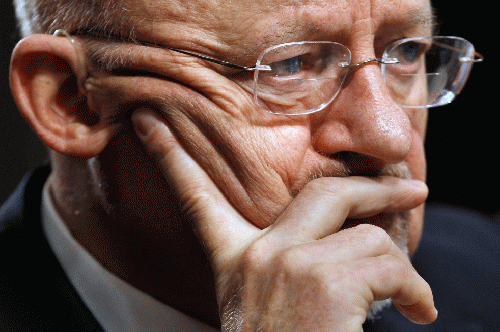This piece was reprinted by OpEd News with permission or license. It may not be reproduced in any form without permission or license from the source.
Source: Baltimore Sun
There is a way out for President Barack Obama as he attempts to cope with Edward Snowden 's disclosures about the National Security Agency 's over-reaching eavesdropping, the turbulent world reaction, and the lack of truthfulness shown by National Intelligence Director James Clapper and NSA Director Keith Alexander. The President should seize the initiative by suggesting to both that they "spend more time with their families."
Not since President George W. Bush attacked Iraq has there been so much discontent among our closest allies with U.S. behavior. This has been somewhat obscured, as U.S. media have chosen to focus mostly on the sins, whereabouts and future of Mr. Snowden, the new Julian Assange-type bete noir.
Most media treatment has diverted attention from obvious violations of our Fourth Amendment rights. But eavesdropped-upon Europeans and others have deep views, born of sad history, that they too must have a right to privacy. And -- allowing for some posturing by politicians -- most countries clearly had little idea of the breathtaking breadth and deep intrusiveness of NSA snooping.
The disclosures risk permanent damage -- not only to the U.S. image, but to the willingness of other governments to cooperate on counterterrorism and other important issues, like trade agreements.
What really rankles the Europeans is their perception that the dragnet-style eavesdropping is based on the premise that all are potential terrorists and thus need to be closely tracked and watched. Amid the brouhaha, one French defense commentator suggested a way out for the president that would be embarrassing but could conceivably save him some face.
Referring to Mr. Obama's claim on June 19 in Berlin that the eavesdropping is aimed at terrorists, the French commentator made a point of using the subjunctive, saying, "If Obama thought he was telling the truth," raising the notion that the president himself may not have been fully apprised of the nature and extent of NSA operations.
Is it possible, though, that the president was unaware? The simple answer is yes. Would it be embarrassing for him to admit that? Again, yes; but perhaps not as embarrassing as to show that he knew chapter and verse. Should he fire those who have lied to Congress? Yes again.
"Plausible denial" is a timeworn tactic used by presidents and senior intelligence officers. Often there is simply an implicit, but nonetheless clear, understanding that the president, Congressional overseers, and perhaps even the judges involved would prefer not to be told everything. It is altogether likely, in my view, that Mr. Obama -- and perhaps even Mr. Clapper -- were kept unaware of the full reach of NSA collection programs. Even if Mr. Obama was, in fact, fully informed by Messrs. Clapper and Alexander, there is nothing to prevent him from trying to exercise the "plausible denial" option.
Except that to do this would require the kind of courage Mr. Obama has not yet shown when up against influential figures in the national security establishment. He would harbor fear that either or both might turn "state's evidence" on him, and could retrieve, or manufacture, persuasive proof that the president was fully briefed.
With most Americans thinking of themselves as non-terrorists, and opposing eavesdropping on them, Mr. Obama could draw on a reservoir of support. Mr. Clapper, after all, has already apologized for lying under oath, and it is an open secret that Mr. Alexander, too, has lied to Congress.
So far, the mainstream media has suppressed the instructive story about how Mr. Alexander lied to Rep. Rush Holt, a New Jersey Democrat and his House Intelligence Committee overseer, in 2005 -- well before Mr. Alexander's more recent playing fast and loose with the truth.
On Dec. 6 of that year, Mr. Alexander assured Mr. Holt that the NSA did not eavesdrop on Americans without the necessary court warrant. Still possessed of the quaint notion that generals and other senior officials are not supposed to lie through their teeth to congressional oversight committees, Mr. Holt wrote a blistering letter to General Alexander after the Times published on its Dec. 16 front page an account of the Bush administration's warrantless wiretapping program.
Mr. Alexander suffered no ill consequences; in fact, he is more powerful today. Now, though, it's in Mr. Obama's best interests to demonstrate that even Mr. Alexander cannot escape accountability for unconstitutional steps to "keep us safe."






